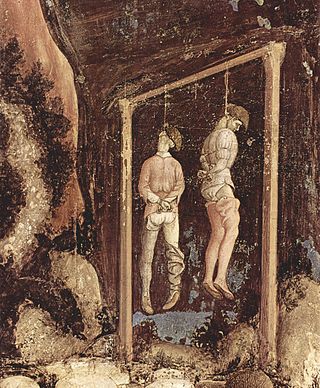
Hanging is killing a person by suspending them from the neck with a noose or ligature. Hanging has been a standard method of capital punishment since the Middle Ages, and has been the primary execution method in numerous countries and regions. The first known account of execution by hanging is in Homer's Odyssey. Hanging is also a method of suicide.

Capital punishment is a legal penalty in the U.S. state of Louisiana.
Capital punishment is a legal penalty in the U.S. state of Utah.

Capital punishment in India is the highest legal penalty for crimes under the country's main substantive penal legislation, the Indian Penal Code, as well as other laws. Executions are carried out by hanging as the primary method of execution per Section 354(5) of the Criminal Code of Procedure, 1973 is "Hanging by the neck until dead", and is imposed only in the 'rarest of cases'.

The use of capital punishment by the United States military is a legal punishment in martial criminal justice. Despite its legality, capital punishment has not been carried out by the U.S. military in over sixty years.
Capital punishment was abolished in Virginia on March 24, 2021, when Governor Ralph Northam signed a bill into law. The law took effect on July 1, 2021. Virginia is the 23rd state to abolish the death penalty, and the first southern state in United States history to do so.

Capital punishment in Sweden was last used in 1910, though it remained a legal sentence for at least some crimes until 1973. It is now outlawed by the Swedish Constitution, which states that capital punishment, corporal punishment, and torture are strictly prohibited. At the time of the abolition of the death penalty in Sweden, the legal method of execution was beheading. It was one of the last states in Europe to abolish the death penalty.
Capital punishment in the Philippines specifically, the death penalty, as a form of state-sponsored repression, was introduced and widely practiced by the Spanish government in the Philippines. A substantial number of Filipino national martyrs like Mariano Gómez, José Burgos, and Jacinto Zamora, Thirteen Martyrs of Cavite, Thirteen Martyrs of Bagumbayan, Fifteen Martyrs of Bicol, Nineteen Martyrs of Aklan and Jose Rizal were executed by the Spanish government.
Capital punishment is a legal penalty in Pakistan. Although there have been numerous amendments to the Constitution, there is yet to be a provision prohibiting the death penalty as a punitive remedy.

Capital punishment in Alabama is a legal penalty. Alabama has the highest per capita capital sentencing rate in the United States. In some years, its courts impose more death sentences than Texas, a state that has a population five times as large. However, Texas has a higher rate of executions both in absolute terms and per capita.
Capital punishment is a legal penalty in the U.S. state of Idaho.

Capital punishment is a legal penalty in the U.S. state of Florida.
Capital punishment refers to the execution of an offender sentenced to death after conviction of a criminal offense. Capital punishment is legal in Afghanistan and can be carried out secretly or publicly due to the current governmental system. The main methods of execution employed by the Afghan government on convicts are hangings and shootings. Stoning, amputation, and flogging are also sometimes used as a method for punishment, and were especially prominent during the late 1990s. Public executions have existed throughout Afghanistan's history. The former Afghan government took important steps away from the use of the death penalty, but they have continued with the Taliban returning to power in August 2021. Some executions have been recently condemned by the United Nations. UN experts have called on Afghan authorities "to halt immediately all forms of torturous, cruel, and degrading forms of punishments." The capital offenses in Afghanistan include a range of crimes from murder to adultery, and are governed by Sharia, along with civil laws.
Capital punishment in South Africa was abolished on 6 June 1995 by the ruling of the Constitutional Court in the case of S v Makwanyane, following a five-year and four-month moratorium that had been in effect since February 1990.
Capital punishment is a legal penalty in the U.S. state of Georgia. Georgia reintroduced the death penalty in 1973 after Furman v. Georgia ruled all states' death penalty statutes unconstitutional. The first execution to take place afterwards occurred in 1983.
Capital punishment is a legal penalty in Jordan. The country had a moratorium on capital punishment between 2006 and 2014. In late 2014 the moratorium was lifted and 11 people were executed. Two more executions followed in 2015, 15 executions took place in 2017 and one in 2021. The method of execution is hanging, although shooting was previously the sole method for carrying out executions.
Capital punishment has been repealed in the U.S. state of Illinois since 2011.
Capital punishment is a legal punishment in Tennessee.
Capital punishment is a legal penalty in the U.S. state of Missouri.
Capital punishment remains a legal penalty for multiple crimes in The Gambia. However, the country has taken recent steps towards abolishing the death penalty.






